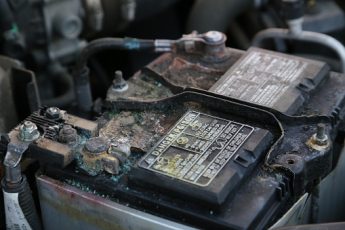Intro
Quick Navigation
There are perks of using a battery; in the same way, there are problems. Batteries are perfect for powering devices and automobiles; however, there are susceptible to corrosion. For instance, due to several reasons, car batteries could have a whitish or greenish, or bluish substance on the terminals; the appearance of these colorations explicitly describes corrosion.
Battery Corrosion reduces the conductivity of electricity needed by a car to function. That is why you will find specific appliances malfunction when the battery is corroded. Now, finding out what causes battery corrosion will go a long way to sustaining the battery’s lifespan.
This article aims to describe the various reasons why this condition happens. Additionally, it will provide tips on how to fix and prevent battery corrosion in the future.
Questions
What are the Causes of Battery Corrosion?
If your car battery gets corroded, it is only because of the following reasons.
- Hydrogen Gas Leakage
Ideally, what causes battery corrosion is the leaking of hydrogen gas from the sulfuric acid content in the battery. The process is called Sulfation. On exposure of the gas to ambient temperature, it starts to form corrosive properties around the battery. In the process, moisture and lead salts are released, and they form bluish or greenish powder around the terminals.
Corrosion’s appearance can also be used to describe a battery’s problem – for instance, a corroded negative terminal means undercharging while a corroded positive terminal describes overcharging.
- Copper Clamps Chemical Reaction
Usually, Copper is an element that doesn’t corrode easily unless it combines with other elements to form a different compound. In the case of a car battery, electric currents passing through copper clamps induces copper sulfate production. Due to this chemical reaction, bluish precipitate forms on the terminals, which means battery corrosion.
- Electrolyte Leakage
If you use a Lead-Acid Battery, there is a good chance that the battery could corrode due to the electrolyte present. Most Lead-Acid Batteries use a liquid acid electrolyte that could undergo Sulfation when you overfill with water; this electrolyte then leaks on the battery terminals. The accumulation of this leakage on the terminal causes battery corrosion.
- Overfilling
As previously described, overfilling the battery with water could cause battery corrosion. What you need to do, however, is ensure that you provide an adequate amount of water that won’t cause the electrolytes to leak.
- Overcharging
An alternator always affects a battery’s quality. If you have a good alternator, there is no doubt that everything would go well; however, a bad alternator causes problems. For instance, a bad alternator could slightly overcharge a battery, leading to battery terminal corrosion.
Even if an alternator is good, avoid charging the battery excessively with a charger.
How to Fix Battery Corrosion?
When you notice these bluish or greenish, or whitish substances, what do you do? You could fix the problem with the following methods.
- Use Soda
Generally, these terminals need carbonic acid to be rid of corrosion. There are several options you could use; however, Soda seems like the most available option. All you have to do is pour some of the soda on the affected terminals and scrub the residues with a soft sponge.
- Use Baking Soda – Water Solution
A lot more effective instead of soda is the Baking soda – water solution. It is also an ideal choice to remove Copper Sulfate from the terminals. The process of removing corroded residue on the terminals is an easy one. You need to remove the terminals and use a brush soaked in baking soda – water solution to clean the residue.
- Use Advanced Corrosion Cleaner
If the situation is a little intense, you could go for an advanced corrosion cleaner option. Here you will need the baking soda – water solution. However, you will have to dip each terminal in the solution and brush the residue off excessively. Afterward, you will have to wipe and clean the terminals either with a damp cloth or sandpaper. Finally, grease these terminals with Vaseline and reattach.
How to Prevent Battery Corrosion?
What if you got a new battery? How do you prevent it from corrosion? Check out the following ways for ultimate prevention.
- Replace an Old Battery
If you are using an old battery, there is a good chance that it will start to corrode when it has lost its potentials to provide energy for every day’s activity. When you begin to notice that the battery is failing, replacing the battery with a new one should be the next thing on your mind. No matter how much you try to sustain the life, it will end up corroding; therefore, plan your budget to get another,
- Buy Anti-Corrosive Sprays
On the market, you will find several anti-corrosive sprays that will help protect metals from corrosion. They should work effectively to protect a battery from corrosion. All you only need to do is apply them on the terminals every once in a while.
- Get Copper Compression Terminals
Since Copper terminals are one reason why a battery corrodes due to contact with electric current, you could go for a different type – Copper Compression Terminals. Unlike the former, they can withstand electric currents without jeopardizing the terminals or the appearance of a bluish substance. Interestingly, they are one of the best-sellers on the market.
- Monitor Charging
Battery Charging, as expected, has a role to play in a battery’s corrosion. One way to avoid that is to subject the battery to proper monitoring. Use a voltmeter or multimeter to measure the voltage and discover how many hours it would take to charge. With this piece of information, try not to charge it less or high, so it doesn’t corrode.
Find out what could drain a car battery‘.
Conclusion
Now that you know what causes battery corrosion, are you willing to do something about it? Yes, you should. Your battery’s life and performance depends on the necessary steps you take to prevent it from corrosion.

